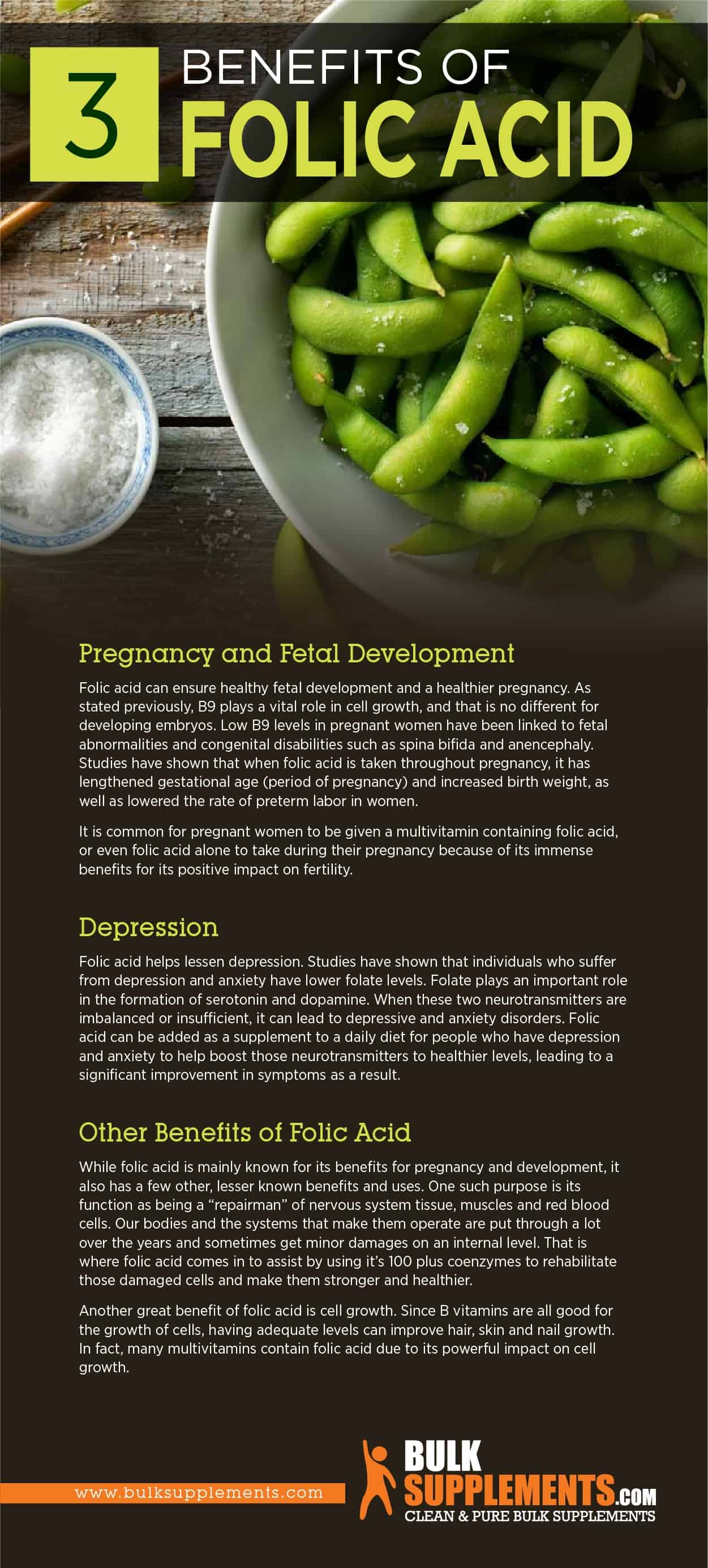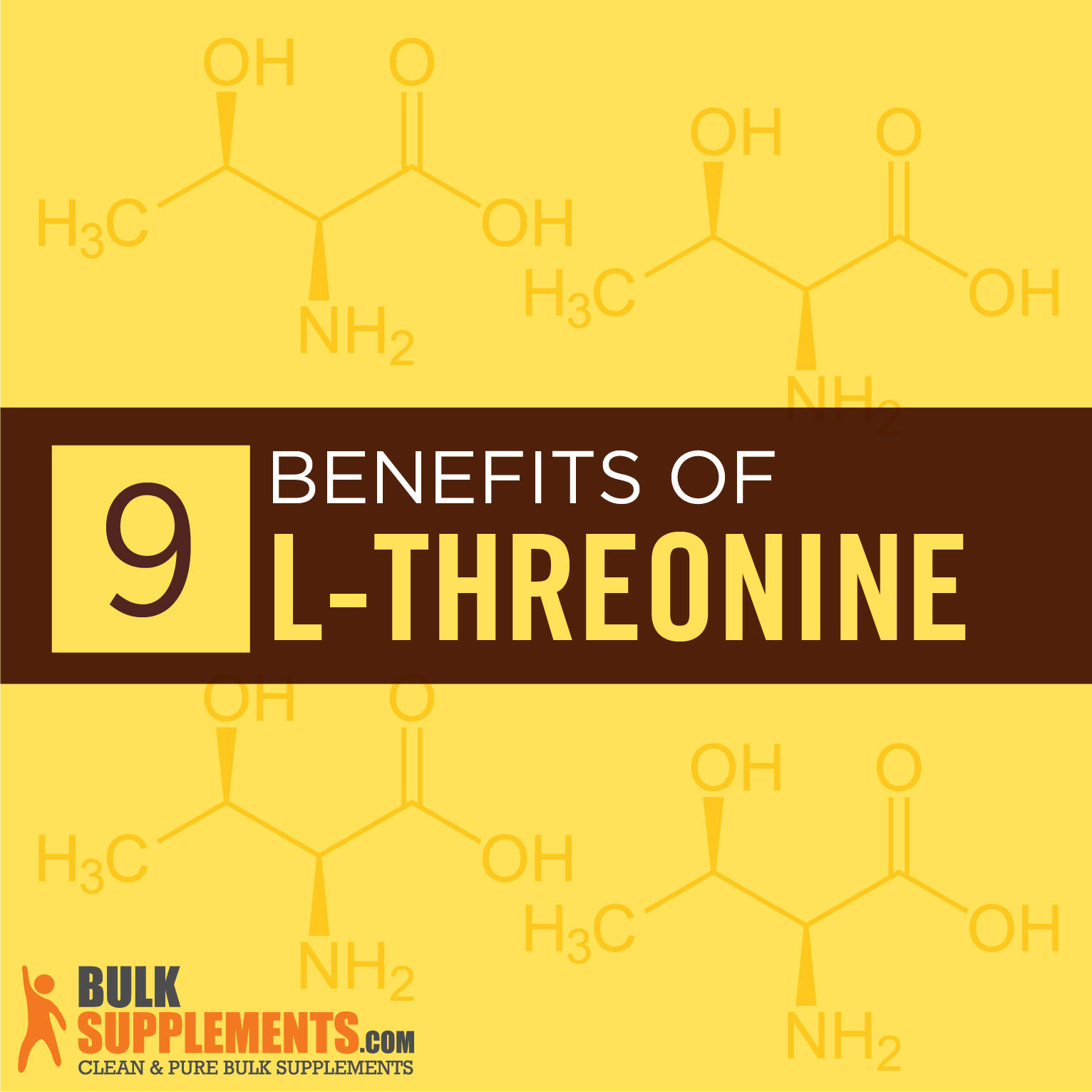Folic Acid (Vitamin B9): Benefits, Side Effects & Dosage
by James Denlinger Digital Marketing StrategistWhat is Folic Acid (Vitamin B9)?
Folic acid is a specific form of vitamin B9 that assists in red blood cell repair and formation. Folate is another type of vitamin B9, but it has distinct differences compared to folic acid; they are both considered vitamin B9. Because their names are frequently used interchangeably, this causes much confusion, even professionally. The simple way to distinguish between the two is that folate is found naturally in foods. Folic acid, however, is the synthetic form of the vitamin.
Since the late 90s, this folic acid property has been added to foods (this is where the term “fortified with” comes from) that do not have naturally occurring folate such as bread, crackers, cereals and baking flours, to name a few. Foods that already have folate (the natural form of B9) in their chemical makeup (such as dark, leafy greens, fruits, okra, beans and meat) do not get folic acid added.
As with most naturally occurring vitamins, it is always better for humans to get the natural form of vitamin B9 (folate) rather than the synthetic kind (folic acid). However, folic acid of any form can be hugely beneficial for people who have a folate deficiency.
To best understand what folic acid is and how it impacts the body, we need to first start by understanding the influence, both good and bad, that vitamin B9 has.
Vitamin B9
The body needs vitamin B9, a water-soluble, essential vitamin and nutrient, to function correctly. It assists with the development of red blood cells, DNA and RNA. It works to form blood cells within the bone marrow, as well as ensures rapid cell growth in fetus’, infants, and teens. The European Food Safety Authority (EFSA) states the health benefits that have been established by the dietary intake of vitamin B9. These include:
- Proper blood formation
- Adequate homocysteine levels (high levels of homocysteine are related to the early development of heart and blood vessel disease)
- Healthy metabolism of the immune system
- Robust cell division
- Strong maternal tissue growth during pregnancy
- Amino acid synthesis within normal parameters
- Normal psychological functions
- Combats tiredness and fatigue
Folic Acid
People who have low blood levels of folate or want to prevent low levels of folate from occurring commonly use folic acid supplements. This could be due to the presence of anemia (a condition where blood lacks enough red blood cells) or an individual who is unable to absorb enough nutrients from the red blood cells.
How the Body Uses It
Folic acid reacts differently compared to its natural counterpart, folate. When an individual takes the supplement, it takes more time for the body to convert all of it to the active form of vitamin B9. Unlike folate, which is absorbed and converted in the digestive system, folic acid must be converted in the liver and other tissues. This does not lessen the positive impact that the supplement has on the body; it merely means that because it is a different form of folate, the body digests it differently.
Folic Acid Benefits and Uses
Pregnancy and Fetal Development
Folic acid can ensure healthy fetal development and a healthier pregnancy. As stated previously, B9 plays a vital role in cell growth, and that is no different for developing embryos. Low B9 levels in pregnant women have been linked to fetal abnormalities and congenital disabilities such as spina bifida and anencephaly. Studies have shown that when folic acid is taken throughout pregnancy, it has lengthened gestational age (period of pregnancy) and increased birth weight, as well as lowered the rate of preterm labor in women.
It is common for pregnant women to be given a multivitamin containing folic acid, or even folic acid alone to take during their pregnancy because of its immense benefits for its positive impact on fertility.
Depression
Folic acid helps lessen depression. Studies have shown that individuals who suffer from depression and anxiety have lower folate levels. Folate plays an important role in the formation of serotonin and dopamine. When these two neurotransmitters are imbalanced or insufficient, it can lead to depression and anxiety disorders. Folic acid can be added as a supplement to a daily diet for people who have depression and anxiety to help boost those neurotransmitters to healthier levels, leading to a significant improvement in symptoms as a result.
Other Benefits of Folic Acid
While folic acid is mainly known for its benefits for pregnancy and development, it also has a few other, lesser known benefits and uses. One such purpose is its function as being a “repairman” of nervous system tissue, muscles and red blood cells. Our bodies and the systems that make them operate are put through a lot over the years and sometimes get minor damages on an internal level. That is where folic acid comes in to assist by using it’s 100 plus coenzymes to rehabilitate those damaged cells and make them stronger and healthier.
Another great benefit of folic acid is cell growth. Since B vitamins are all good for the growth of cells, having adequate levels can improve hair, skin and nail growth. In fact, many multivitamins contain folic acid due to its powerful impact on cell growth.
 PIN IT
PIN ITVitamin B9 in Foods
If you are less than thrilled at the idea of taking the synthetic version of vitamin B9, it is not vital that you do. It is reasonably easy to get the daily required amount of B9 via natural ways (which means you will be consuming the nature-grown folate form of B9, not folic acid). Below is a list of folate-rich foods that you can add to your daily diet.
- Broccoli
- Avocados
- Lettuce (or any leafy green)
- Oranges
- Lentils
- Bananas
- Asparagus
- Wholewheat flour
- Melons
- Brussels sprouts
Folic Acid Deficiency
When someone is suffering from a deficiency, it means that there is not enough folate or folic acid in the body. Whether that is due to a diet lacking in B9-rich foods or because their body is unable to process B9 properly, it can cause long-lasting side effects if not addressed. Anemia is the more prominent issue that arises from deficiency, as well as depression, memory and brain function problems, possible bone weakening, etc.
B9 deficiency is typically an easy problem to avoid. This, of course, is dependent on one having a balanced diet or adding a daily supplement of folic acid.
Folic Acid Side Effects
Generally, folic acid supplements are safe to take. Even the rare side effects of taking too much are minimal. As long as the daily dose remains under 1,000 mcg daily, side effects are unlikely to occur.
The unlikely, minor side effects that can occur are as follows:
Because folic acid is a water-soluble substance, it is easily eliminated from the body via urinary excretion. This also makes the risk of toxicity very low.
Folic Acid Dosage
When supplementing with folic acid powder, take no more than 500 mcg to 1 mg daily. Store the powder in a dry and cool location. Of course, be sure to speak to a medical professional before adding this supplement to your regimen.
The Bottom Line
Folic acid is an essential part of a functioning body. Luckily, because there are so many foods both ample in natural folate and folic acid-fortified, it is incredibly easy to get exactly what we need from these foods. Women who are trying to become or are already pregnant are strongly encouraged to add more folic acid to their diets, as it has proven to be incredibly beneficial to a healthy pregnancy and a healthy baby.
As always, it is important to discuss adding any supplement to your regimen with a medical professional.
Sponsor Ads
Created on Mar 17th 2020 00:32. Viewed 381 times.




